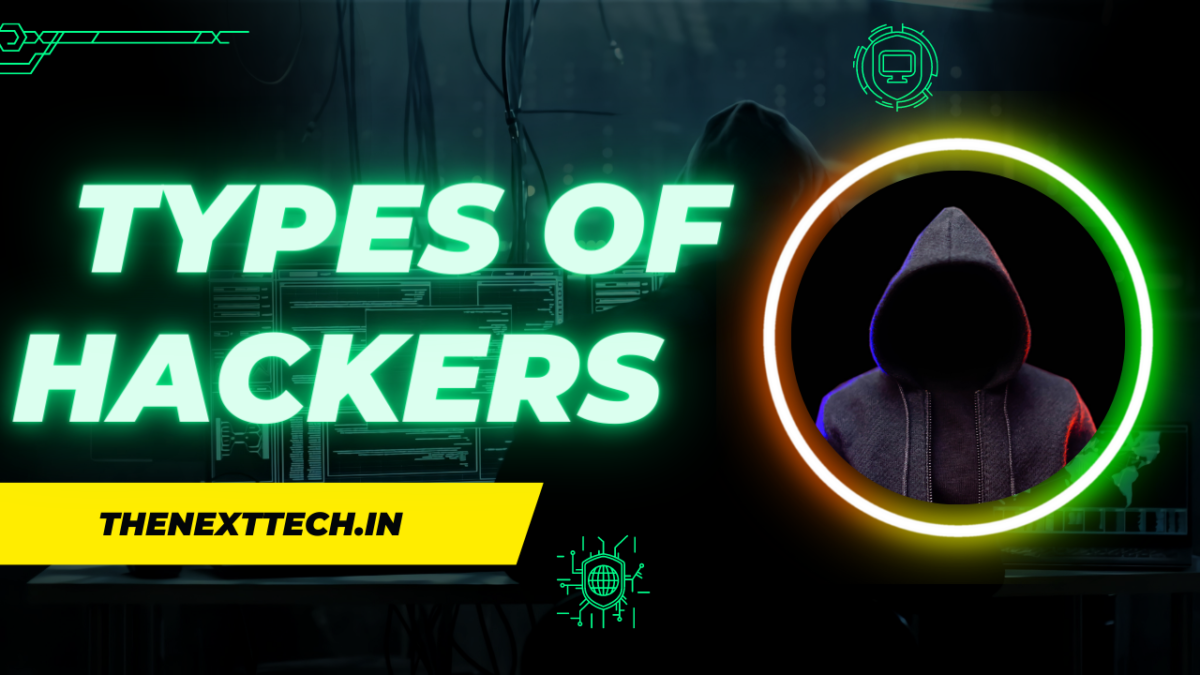Before we talk about different types of hackers, first of all we let you know:
What is Hacking? What are different types of Hackers?
Hacking refers to the act of gaining unauthorized access to computer systems, networks, or digital devices, often with the intent to manipulate, steal, disrupt, or exploit information. It involves exploiting vulnerabilities in software, hardware, or security measures to breach the security of a system, allowing the different type of hackers to access, alter, or extract data for various purposes, both benign and malicious.
Hacking, in simple words, is when someone uses their computer skills to get into computer systems, websites, or programs without permission. It’s like sneaking into a locked building or room to see, steal, or change things you’re not supposed to. Hacking can be done for different reasons, like finding and fixing security problems or trying to steal information.
In the vast and intricate realm of cyberspace, a diverse range of individuals with varying intentions wield the power to breach digital fortresses and navigate through virtual landscapes. These modern-day digital adventurers, or different types of hackers is not a monolithic entity but instead encompass a spectrum of motives, skills, and ethical stances. In this comprehensive guide, we will traverse the intricate web of cyber intruders and explore the distinct categories that comprise the world of hacking.
Now let’s discuss different types of hackers.

Different Types Of Hackers
1.White Hat Hackers - (The Digital Guardians)
White Hat Hackers, often referred to as ethical hackers, dedicate their skills to strengthen cybersecurity defenses. These virtuous tech wizards work with organizations to uncover vulnerabilities before malicious hackers can exploit them. Employing their expertise in penetration testing and vulnerability assessments, they are akin to digital guardians, protecting systems, networks, and sensitive data from potential threats.
These type of hackers are like the heroes of the digital realm. They’re the good guys in the world of hacking. Instead of causing harm, they use their skills to protect and defend computer systems and networks from bad hackers.
Think of them as the cybersecurity experts who work with companies to find any weak spots in their digital defenses. They’re like the locksmiths who make sure all the doors and windows are locked tight to keep the bad guys out.
White Hat Hackers don’t do it for personal gain or to cause trouble. They do it because they believe in making the online world a safer place for everyone. They’re the ones who find the cracks in the digital armor before the bad guys can find them.
2.Black Hat Hackers - (The Dark Operatives)
On the flip side, Black Hat Hackers operate with malicious intent. Of all the different types of hackers these are driven by personal gain, these nefarious individuals breach systems, networks, and databases for financial profit, political motives, or simply the thrill of illicit activities. Their expertise in crafting sophisticated malware, executing phishing attacks, and exploiting security weaknesses underscores the importance of robust cybersecurity measures.
Black Hat Hackers are the counterparts to the good guys in the digital realm. These are the individuals who use their technical skills for less-than-honorable purposes. Instead of protecting computer systems, they exploit vulnerabilities to gain unauthorized access, cause chaos, and sometimes even steal sensitive information.
Imagine them as the digital troublemakers, using their knowledge to break into systems, networks, and databases. They might create and spread harmful software that can infect computers and steal personal data. In some cases, they’re motivated by financial gain, aiming to make money off their illicit activities.
Unlike White Hat Hackers who work to strengthen cybersecurity, Black Hat Hackers seek to exploit weaknesses for personal gain or to cause disruptions. They might engage in activities like hacking websites, spreading viruses, or even launching attacks that can bring down entire networks.
3.Grey Hat Hackers - (The Moral Ambiguity)
Grey Hat Hackers are of unique kind form all the different types of hackers as they exist in the ethical gray zone between the virtuous White Hats and the malicious Black Hats. With intentions that can range from exposing vulnerabilities to seeking attention, these hackers often operate without explicit permission from the targeted entity. While their motives may not always align with the law, they can sometimes act as catalysts for positive change by uncovering security flaws that others might exploit.
Grey Hat Hackers occupy a complex and nuanced space within the digital landscape, straddling the line between ethical and questionable actions. Unlike White Hat Hackers who uphold the law or Black Hat Hackers who often break it, Grey Hat Hackers exist in a realm of moral ambiguity.
Picture them as digital adventurers who embark on journeys that don’t neatly fit into the categories of good or bad. These hackers may identify vulnerabilities in systems and networks, much like White Hat Hackers, but they don’t always seek explicit permission before doing so. Their motives can range from a desire to expose weaknesses and promote better security practices to seeking recognition for their skills.
In some cases, Grey Hat Hackers might cross ethical boundaries by accessing systems without proper authorization. However, they may not necessarily use the information they find for malicious purposes. Their actions could be driven by a sense of curiosity, a desire to push the boundaries of technology, or even a personal agenda.
4.Hacktivists - (The Digital Crusaders)
Hacktivists are hackers who channel their skills for social or political activism. They aim to raise awareness or bring about change by targeting organizations or entities they perceive as unjust. Motivated by ideology, these digital crusaders engage in cyber protests, defacing websites, and sometimes leaking confidential information to draw attention to their causes.
Among all the different type of hackers, Hacktivists are modern-day crusaders who wield their digital skills as a force for social or political change. Unlike traditional activists who take to the streets, these individuals operate in the virtual realm, leveraging their technical expertise to draw attention to issues they’re passionate about.
Imagine them as digital advocates who use their keyboards as swords and their code as armor. Hacktivists are driven by ideologies and causes they believe in, and they employ their skills to make their voices heard on a global scale. They might target websites, databases, or online platforms to make a statement or expose perceived injustices.
Hacktivists don’t seek personal gain; instead, their motivation comes from a desire to spark conversations, raise awareness, and provoke action. Their tactics can vary widely, from defacing websites with messages that align with their cause to releasing confidential information that sheds light on matters of public interest.
5.State-Sponsored Hackers - (The Nation's Cyber Assets)
State-sponsored hackers are backed by governments to conduct cyber espionage, gather intelligence, or launch cyber attacks against other nations. Their targets can range from political opponents to critical infrastructure. Their advanced techniques and vast resources underscore the ongoing cybersecurity challenges faced by countries around the world.
State-sponsored hackers, often operating in the shadows, which make the a different type of hackers which represent a distinct breed of digital operatives with ties to governmental entities. These cyber assets are deployed by nations to carry out a range of activities, from intelligence gathering to strategic cyber attacks. Their expertise and resources make them a formidable presence in the world of hacking.
Picture them as the elite operatives of the digital realm, armed with advanced techniques and often backed by significant funding. State-sponsored hackers serve the interests of their nations, carrying out cyber espionage to gather intelligence on other countries, organizations, or individuals. Their activities can include infiltrating networks, stealing sensitive data, and even conducting covert surveillance.
Unlike individual hackers, state-sponsored hackers are part of larger strategies and geopolitical agendas. Their targets can encompass political adversaries, critical infrastructure, or industries crucial to a nation’s economy. The consequences of their actions can extend beyond the digital realm, impacting international relations and national security.
6.Script Kiddies - (The Novice Tinkerers)
Script Kiddies are amateur hackers with limited technical skills who rely on pre-existing tools and scripts to carry out attacks. While their actions might not be as sophisticated as those of seasoned hackers, they can still cause disruptions and security breaches. Their activities highlight the importance of user education and strong cybersecurity practices.
Script Kiddies, while not as seasoned as other different types of hackers, are the curious newcomers to the world of digital manipulation. Think of them as the young enthusiasts who are eager to explore the possibilities of hacking, often with limited technical skills but a whole lot of enthusiasm.
Unlike more sophisticated hackers, Script Kiddies tend to rely on pre-existing tools and scripts to carry out their endeavors. Imagine them as the digital explorers armed with a treasure map, following the instructions step by step, without necessarily understanding the intricacies of the journey.
Their actions might lack the finesse of experienced hackers, but they can still cause disruptions and compromises in digital spaces. Script Kiddies might engage in activities like defacing websites, spreading simple malware, or attempting basic phishing attacks. Their activities can be disruptive and annoying, although they may not always pose a serious threat to well-protected systems.
Conclusion from different types of hackers.
In conclusion, delving into the intricate realm of hackers reveals a multifaceted landscape where motivations, ethics, and methods diverge widely. We’ve explored the different types of hackers, from ethical hackers or “white hats” committed to strengthening cybersecurity, to malicious actors like “black hats” seeking personal gain at the expense of others.
Understanding these different types of hackers and their personas is essential for individuals and organizations alike. It allows us to better protect our digital assets, maintain privacy, and fortify our defenses against cyber threats. As technology continues to evolve, the dynamic nature of hacking means that new types of hackers may emerge.
The key takeaway here is that while the term “hacker” often carries a negative connotation, it’s crucial to recognize that not all hackers are malicious. Ethical hackers play a vital role in identifying vulnerabilities and safeguarding our digital world.
By staying informed about the diverse landscape of hackers, we empower ourselves to navigate the digital age more securely. Whether you’re intrigued by the world of hacking or simply want to protect your digital presence, understanding the different types of hackers is an essential step toward a safer online environment. Stay vigilant, stay informed, and stay secure.





5 Comments
Your comment is awaiting moderation.
Thanks for sharing. I read many of your blog posts, cool, your blog is very good.
Your comment is awaiting moderation.
Can you be more specific about the content of your article? After reading it, I still have some doubts. Hope you can help me.
Your comment is awaiting moderation.
Your article helped me a lot, is there any more related content? Thanks!
Your comment is awaiting moderation.
Thanks for sharing. I read many of your blog posts, cool, your blog is very good.
Your comment is awaiting moderation.
Thank you for your sharing. I am worried that I lack creative ideas. It is your article that makes me full of hope. Thank you. But, I have a question, can you help me?
Your comment is awaiting moderation.
Thanks for sharing. I read many of your blog posts, cool, your blog is very good.
Your comment is awaiting moderation.
Your point of view caught my eye and was very interesting. Thanks. I have a question for you.
Your comment is awaiting moderation.
Thank you for your sharing. I am worried that I lack creative ideas. It is your article that makes me full of hope. Thank you. But, I have a question, can you help me?
Your comment is awaiting moderation.
Thanks for sharing. I read many of your blog posts, cool, your blog is very good. https://accounts.binance.com/es-MX/register?ref=JHQQKNKN
Your comment is awaiting moderation.
Your point of view caught my eye and was very interesting. Thanks. I have a question for you.
Your comment is awaiting moderation.
Your point of view caught my eye and was very interesting. Thanks. I have a question for you.
Your comment is awaiting moderation.
I don’t think the title of your article matches the content lol. Just kidding, mainly because I had some doubts after reading the article.
Your comment is awaiting moderation.
Your article helped me a lot, is there any more related content? Thanks!
Your comment is awaiting moderation.
Your article helped me a lot, is there any more related content? Thanks!
Your comment is awaiting moderation.
Thanks for sharing. I read many of your blog posts, cool, your blog is very good.
Your comment is awaiting moderation.
Thank you for your sharing. I am worried that I lack creative ideas. It is your article that makes me full of hope. Thank you. But, I have a question, can you help me? https://accounts.binance.com/pl/register-person?ref=YY80CKRN
Your comment is awaiting moderation.
Your article helped me a lot, is there any more related content? Thanks!
Your comment is awaiting moderation.
Thank you for your sharing. I am worried that I lack creative ideas. It is your article that makes me full of hope. Thank you. But, I have a question, can you help me?
Your comment is awaiting moderation.
Thanks for sharing. I read many of your blog posts, cool, your blog is very good.
Your comment is awaiting moderation.
Thank you for your sharing. I am worried that I lack creative ideas. It is your article that makes me full of hope. Thank you. But, I have a question, can you help me?
Your comment is awaiting moderation.
Thank you for your sharing. I am worried that I lack creative ideas. It is your article that makes me full of hope. Thank you. But, I have a question, can you help me?
Your comment is awaiting moderation.
I don’t think the title of your article matches the content lol. Just kidding, mainly because I had some doubts after reading the article.
Your comment is awaiting moderation.
Can you be more specific about the content of your article? After reading it, I still have some doubts. Hope you can help me.
Your comment is awaiting moderation.
Thanks for sharing. I read many of your blog posts, cool, your blog is very good.
I don’t think the title of your article matches the content lol. Just kidding, mainly because I had some doubts after reading the article.
Your comment is awaiting moderation.
Your point of view caught my eye and was very interesting. Thanks. I have a question for you. https://accounts.binance.com/en/register?ref=JHQQKNKN
Your comment is awaiting moderation.
Thanks for sharing. I read many of your blog posts, cool, your blog is very good. https://www.binance.com/bg/join?ref=V2H9AFPY
Your comment is awaiting moderation.
I don’t think the title of your article matches the content lol. Just kidding, mainly because I had some doubts after reading the article. https://accounts.binance.com/sl/register?ref=PORL8W0Z
Your comment is awaiting moderation.
I don’t think the title of your article matches the content lol. Just kidding, mainly because I had some doubts after reading the article.
Your comment is awaiting moderation.
I don’t think the title of your article matches the content lol. Just kidding, mainly because I had some doubts after reading the article.
Your point of view caught my eye and was very interesting. Thanks. I have a question for you.
Your article helped me a lot, is there any more related content? Thanks!
[…] need for cyber security as more and more money, businesses, jobs, and information are online. Internet crime is frequently so sophisticated that you need specialized protection to keep yourself safe. […]
[…] What Are Different Types Of Hackers […]